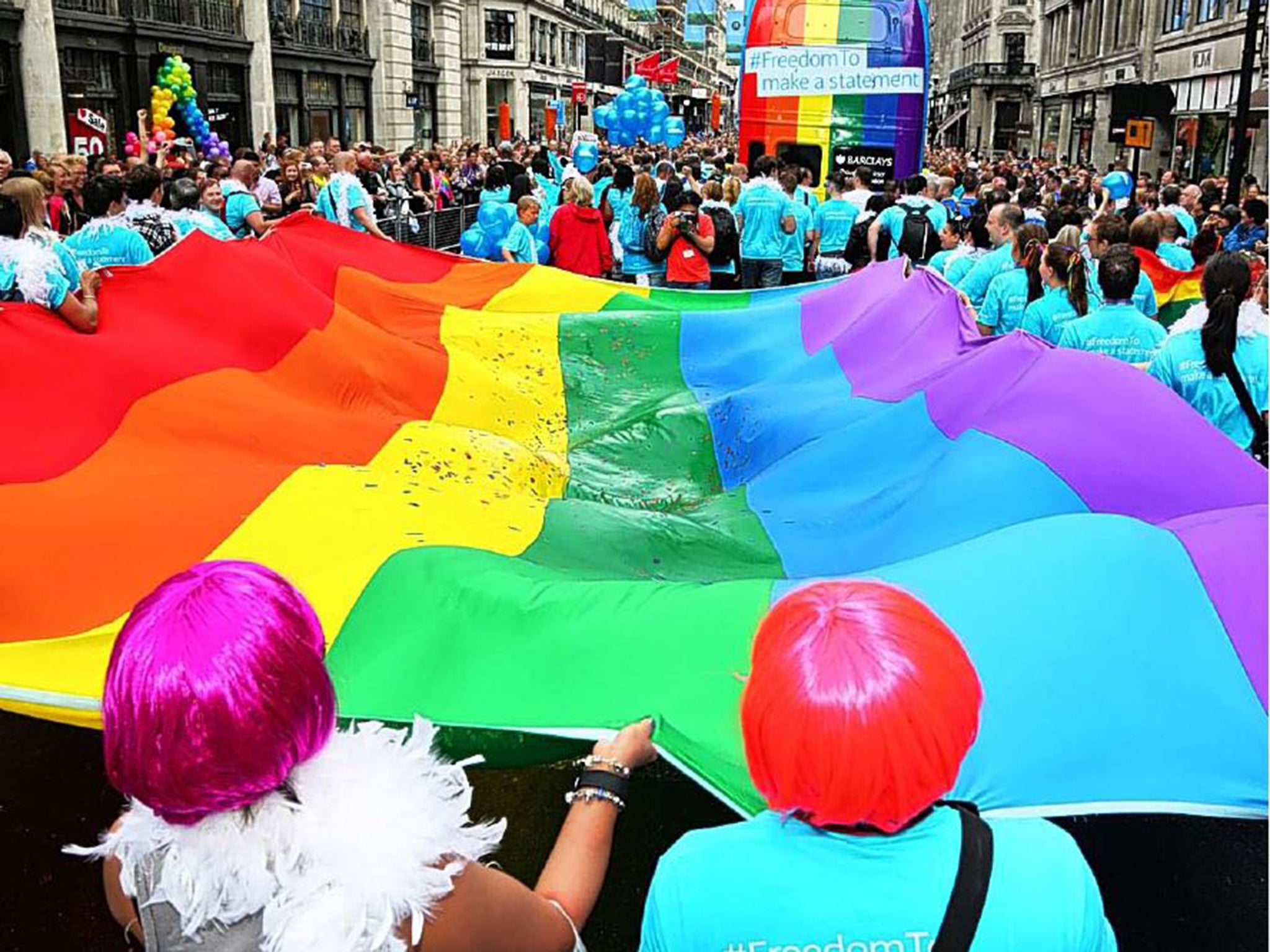Your support helps us to tell the story
From reproductive rights to climate change to Big Tech, The Independent is on the ground when the story is developing. Whether it's investigating the financials of Elon Musk's pro-Trump PAC or producing our latest documentary, 'The A Word', which shines a light on the American women fighting for reproductive rights, we know how important it is to parse out the facts from the messaging.
At such a critical moment in US history, we need reporters on the ground. Your donation allows us to keep sending journalists to speak to both sides of the story.
The Independent is trusted by Americans across the entire political spectrum. And unlike many other quality news outlets, we choose not to lock Americans out of our reporting and analysis with paywalls. We believe quality journalism should be available to everyone, paid for by those who can afford it.
Your support makes all the difference.LGBT identities aren’t directly inherited from straight parents, and our history is usually not taught to us at school. This makes it all too easily lost, or rewritten.
February is LGBT History Month in the UK and it’s important: knowledge of any history directs political energy and shapes one’s sense of identity. So here’s a list of the five most important landmark moments in LGBT history (in my opinion), worth educating yourself on, whatever your sexuality or gender identity:
Section 28
This toxic Tory legislation banning the ‘promotion’ of homosexuality in UK schools was repealed in 2003 but its legacy lives on. In 1988, it was enacted, stating that a local authority “shall not intentionally promote homosexuality or publish material with the intention of promoting homosexuality” or “promote the teaching in any maintained school of the acceptability of homosexuality as a pretended family relationship”.
Many queer teens still learn about sex from porn and learn little about sexual health.
The Terrence Higgins Trust estimates 1 in 8 men who have sex with men in London are HIV positive and many of these men are unaware of their status. The HIV prevention drug, PrEP, isn’t available on the NHS and funding for LGBT sexual health services are being cut.
Section 28 may have gone, but it’s worth remembering how recently this was a mainstream view in the Conservative party.
The Berlin Institute of Sexology
Trans people received healthcare, jobs, accommodation and legal protection at Magnus Hirschfeld’s pioneering Institut für Sexualwissenschaft from 1919 until 1933, when the Hitler Youth burned its archives.
Its residents almost certainly were executed in the Holocaust. While the human crime and the loss of the Institute’s records are one of history’s great tragedies, it’s important for young trans people to recognise we have always existed (yes, before Caitlyn Jenner) and we still must stand politically against all forces which deny us our needs: healthcare, financial security and housing.
The origins of Pride
Last year UKIP’s LGBT wing lobbied to march at Pride, provoking a debate that often seemed ignorant of history. In fact, the first Pride in 1972 was not a festival or party but a radical protest, made up of anti-racist radical groups like the Brixton Fairies who would have balked at UKIP’s policies.
As Frankie Green, one of the first lesbian activists to march, wrote in an open letter: “I believe most of us in that optimistic era never dreamt of a time when a group such as UKIP would co-opt our activism…you misrepresent the notion of inclusivity and render it superficial at best if you think we could be connected in any way to the kind of narrow, xenophobic views espoused by UKIP.”
The life of Lou Sullivan
Lou Sullivan was the first transgender man to also be openly gay. Before Sullivan’s gender reassignment surgery in 1986, received medical wisdom insisted trans people should only be allowed to transition into heterosexuals.
Sullivan successfully campaigned against this, championing the idea that gender and sexuality were distinct. Misogyny provokes a lurid societal fascination with trans women while the histories and lives of trans men are forgotten. When modern debates ask if trans people should stay within the “LGBT’ bracket, Sullivan’s life crucially reminds us that some people are both trans and gay.
Stonewall Riots
Riots against police raids at the Stonewall Inn in June 1969 sparked the LGBT liberation movement. The leaders of those riots were people like Marsha P Johnson, a black drag queen. Five decades on, internalised homophobia and embarrassment about “effeminate” gays is rife - forgetting how we owe it all to drag queens and femmes, who refused to be respectable.
Johnson’s race must not be overlooked. When Ivan Massow, a millionaire who last year unsuccessfully bid to be the Tory London Mayoral candidate tweeted “Hope black leaders aren't gonna bleat on about stuff said 30yrs ago. Just remember how whites/blacks alike cruelty [sic] attacked gays! (Still do)” he seemed to forget that black LGBT people exist.
A survey by FS magazine last year indicated racism is still prevalent on the gay scene. We should remember much of the LGBT movement was led by minorities who remain oppressed and let this shape our politics today.

Join our commenting forum
Join thought-provoking conversations, follow other Independent readers and see their replies
Comments